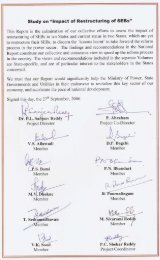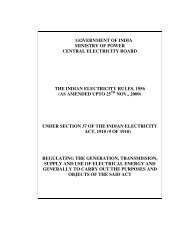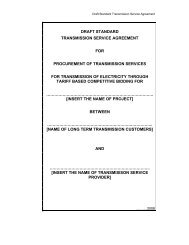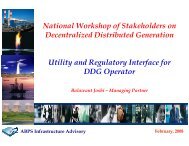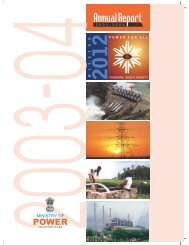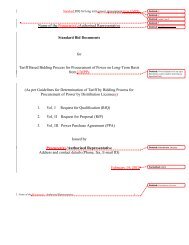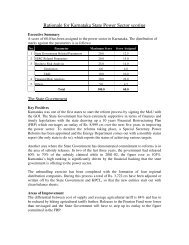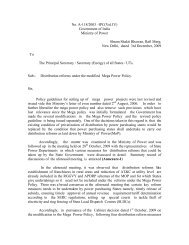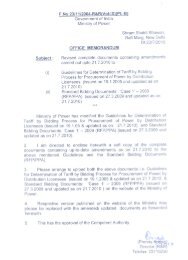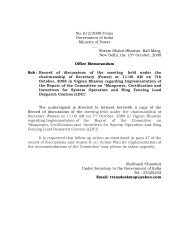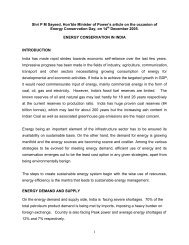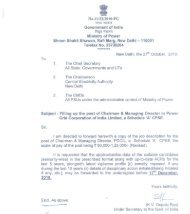Inside Pages9Final.indd - Ministry of Power
Inside Pages9Final.indd - Ministry of Power
Inside Pages9Final.indd - Ministry of Power
You also want an ePaper? Increase the reach of your titles
YUMPU automatically turns print PDFs into web optimized ePapers that Google loves.
under respective State Reforms Acts. These SERCs have<br />
been continued under the provisions <strong>of</strong> Electricity Act,<br />
2003.<br />
So far twenty five states viz. Orissa, Haryana, Andhra<br />
Pradesh, Uttar Pradesh, Karnataka, West Bengal,<br />
Tamil Nadu, Punjab, Delhi, Gujarat, Madhya Pradesh,<br />
Maharashtra, Rajasthan, Himachal Pradesh, Assam,<br />
Chhatisgarh, Uttaranchal, Goa, Bihar, Jharkhand, Kerala,<br />
Tripura, Sikkim, Jammu & Kashmir and Meghalaya have<br />
either constituted or notified the constitution <strong>of</strong> SERC.<br />
Joint Electricity Regulatory Commission (JERC) has been<br />
notified for Mizoram and Manipur. JERC has also been<br />
notified for Union Territories (except Delhi).<br />
Twenty SERCs viz. Orissa, Andhra Pradesh, Uttar Pradesh,<br />
Maharashtra, Gujarat, Haryana, Karnataka, Rajasthan,<br />
Delhi, Madhya Pradesh, Himachal Pradesh, West Bengal,<br />
Punjab, Tamil Nadu, Assam, Uttaranchal, Jharkhand,<br />
Kerala, Chhattisgarh and Tripura have issued tariff orders.<br />
viii) Appellate Tribunal For Electricity<br />
Under the provisions <strong>of</strong> Section 110 <strong>of</strong> the Electricity<br />
Act, 2003, the Appellate Tribunal for Electricity has been<br />
established at Delhi which will hear appeals against the<br />
orders <strong>of</strong> the Adjudicating Officer or the appropriate<br />
Regulatory Commission under the Act. The Tribunal has<br />
become operational from 21st July, 2005. The Tribunal<br />
comprises <strong>of</strong> Chairperson & Judicial Member, Judicial<br />
Member, 2 Technical Members.<br />
B. RESPONSE FROM THE PRIVATE SECTOR<br />
Private power projects being monitored by Central<br />
Government: The response to GOI’s energy policy had<br />
been initially encouraging. Since 1991, a total capacity <strong>of</strong><br />
around 7417.21 MW from 39 private power plants has so far<br />
been commissioned and another capacity <strong>of</strong> around 5000<br />
MW from 13 projects is under implementation. However,<br />
there have been impediments in achieving the targeted<br />
capacity from the private sector. The major impediments to<br />
the speedy development <strong>of</strong> private sector power projects<br />
are as follows:<br />
i) Inability <strong>of</strong> SEBs and State Governments to provide an<br />
acceptable payment security. The revenues <strong>of</strong> the SEBs<br />
are not adequate to ensure payments to Independent<br />
<strong>Power</strong> Producers. This is due to irrational tariffs and<br />
poor collection efficiencies.<br />
MINISTRY OF POWER<br />
ii) Delay in finalisation <strong>of</strong> various contracts such as<br />
PPA, Fuel Supply Agreement and Fuel transportation<br />
Agreement acceptable to all the concerned parties.<br />
Protracted negotiations on fuel prices, liquidated<br />
charges/damages, risk covering clauses etc have<br />
caused delays in many cases.<br />
iii) Liquid Fuel and Gas constraints: One <strong>of</strong> the factors<br />
responsible for poor private investments in thermal<br />
power generation is the non availability <strong>of</strong> fuel at<br />
competitive rates. Many initial projects under private<br />
sector had proposed liquid fuels for power generation<br />
so as to get quick returns on their investments but<br />
due to volatility <strong>of</strong> price <strong>of</strong> naphtha in the international<br />
market, projects became unviable and naphtha<br />
reswitching over to natural gas. However, the pricing<br />
mechanism adopted for natural gas i.e. linking the price<br />
<strong>of</strong> domestically produced gas to international crude is<br />
becoming an area <strong>of</strong> concern now. There is need to<br />
expedite the development <strong>of</strong> indigenous natural gas<br />
reserves as well as to rationalize the price <strong>of</strong> LNG so<br />
that more and more private investors are attracted for<br />
setting up <strong>of</strong> gas based power plants in the country.<br />
iv) Problems in sourcing coal supplies and coal<br />
linkages:<br />
1. Difficult to get Coal Linkages for new <strong>Power</strong><br />
Projects. Even the linkages being granted are for<br />
80% PLF (Contract Quantity). Out <strong>of</strong> this the coal<br />
companies take guarantee to supply only 80% <strong>of</strong><br />
Contract Quantity which results into coal required<br />
for approximately 64% PLF. This is not sufficient for<br />
recovering full Fixed Capacity Charge as per CERC<br />
norms (80% PLF).<br />
2. The linkages granted are not from the mines<br />
nearest to the <strong>Power</strong> Plants, which involves long rail<br />
transportation thereby increasing the <strong>Power</strong> Tariff.<br />
There is a need for expediting the coal allocations and<br />
supplies for private power developers. There is an<br />
enormous mismatch between the requirements <strong>of</strong> coal<br />
for the power sector and the corresponding supplies.<br />
This gap between supply and demand is expected to<br />
further widen in the coming years, unless immediate<br />
steps are taken for capacity augmentation in supply <strong>of</strong><br />
coal and imports to bridge the shortfall.<br />
41



